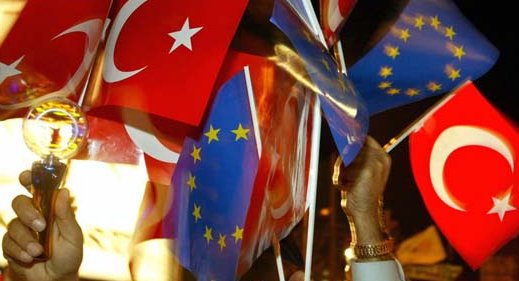Statements on the European Union by Turkish ministers and AKP politicians that have appeared in the media in the past few days seem to signal widespread anti-EU feelings of unprecedented intensity. The tone of this campaign is unusually harsh. Together with new theories being rolled out, it raises the question of the objectives Turkey’s political leadership is really following and tends to feed the impression that Turkey is distancing itself from the EU accession process for fundamental ideological reasons.
The Minister of Economy, Zafer Çağlayan, is undoubtedly taking a prominent place in the current spat. On October 16 he declared that EU visas were equivalent to "crimes against humanity" and "torture", and that the EU should be awarded a Nobel Prize for "hypocrisy". The use of such terms is truly stunning.
Another AKP politician, Deputy Burhan Kuzu, threw the 2012 EU Progress Report on Turkey to the floor during a live television appearance on CNN Türk on October 11. Although obviously an elected politician is free to express any opinion on the progress report, such anger does not exactly fit the policy of a government and a party which, to this date, still declares in official statements—from the President, the Foreign Minister, and the EU Minister—and in AKP policy documents, that accession to the EU is the standing policy.
Finally, one can only wonder why EU Minister, Egemen Bağış, dismissed the European Parliament’s upcoming Turkey report before any debate had even taken place. After all, is the European Parliament not the democratically-elected branch of the EU’s institutional triangle?
The accumulation of such developments at a time when the EU Council of Ministers and the European Parliament are starting their yearly proceedings on Turkey can hardly be interpreted as the fortuitous coincidence of "statements addressed to the domestic audience". Everyone knows that, in this age of internet and Twitter, there is no difference between a statement directed at a local audience and a statement to the entire world.
With their EU audience in mind, Turkish politicians know only too well that these statements do in fact “make Turkey's EU policy" and will be used by those within the EU who are not particularly favorable to the Turkish dossier. The more positive statements by the President of the Republic on October 1 and by the President of TUSIAD on October 17 will not, I am afraid, erase the malaise created in Brussels and many other European capitals.
Beyond the heated words of daily politics, it is also telling to refer to the description of Turkey's foreign policy made at the Istanbul Forum, an open conference held between October 8 and 10, by Ibrahim Kalın, Chief Foreign Policy Adviser in the Prime Minister's Office.
Kalın first reiterated a number of well-known points. He highlighted the lack of consistency in EU foreign policy, argued that Turkey’s Muslim identity is "the main reason for Turkey's endless sitting at the EU door", and said that the EU had made a "serious strategic mistake" by not including Turkey as a full member, particularly given the latter’s "relevance" in "the new geopolitical framework". These are observations that a number of Europeans would also subscribe to.
Delving further into Turkey's foreign policy, Kalın added two important elements.
Firstly, he emphasized that the definition of Turkey’s national interest has been "expanded to include value-based considerations". Although he provides no clear account of what these values are, he contrasts this argument with the “over-secularization of the West”. Taken, together with his previous writings, this would suggest that Kalın is referring to religious values.
Secondly, he explained that the country’s "new security conception (...) is grounded in the larger concepts of cultural affinity, historical companionship, geographical proximity, social imagery, and how they create a sense of belonging".
Neither of these elements is new, as they were both theorized a decade ago by the current Foreign Minister, Ahmet Davutoğlu, and have been reiterated many times since.
What is new is Kalın's conclusion, as reported by the media: "Turkey is beginning to read history from a non-Eurocentric point of view and to recognize other possibilities in modern history".
To my knowledge, this is to date the clearest public, on-the-record expression of Turkey's inclination to challenge its 89-year old anchorage to the West and, perhaps, question its drive towards the EU too. At the very least, Kalın’s speech introduces a question mark.
How fast would such ideas translate into policy? How far would they go? How compatible would they be with the NATO membership and the EU accession process? Nobody can tell at this point.
Personally, as much as I understand and value Turkey’s cultural and religious affinities with the rest of the Muslim world, I still take the strong view that its economic future remains deeply rooted in the EU—trade, investment, technology, innovation—as demonstrated by available statistics and the absence of credible alternatives. Moreover, considering the serious political and security challenges it faces in its immediate non-EU environment, Turkey’s best strategic option remains its anchorage to the West, NATO, and the EU.
No doubt, all this will be intensely debated in the months to come.







.jpg)